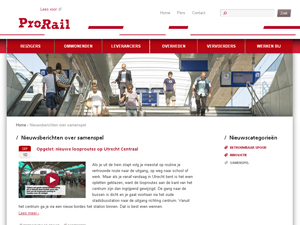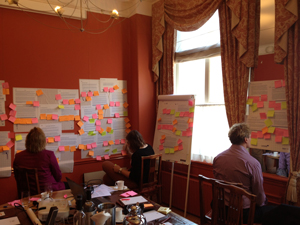Willem Brethouwer and Ruben Mensink
Suppose you work in the mobility business. What business are you in then? Suppose you work in a company that is responsible for the infrastructure ( i.e. railway network and train planning). What kind of business are you in then? Are you a utility company, a travel company, a building company or a connection company? In the good old days it was the ultimate question: what business are you in? It would initiate a discussion on objectives, SWOT, strategy development, target group definition and the marketing mix. That all seems so long ago… Nowadays we talk SoLoMo, transparency, eco awareness and complexity. Almost every organisation is now impacted by what seems to be a permanent consumer force. In the current age of digitisation consumers have become prosumers and intertwine with producers. The voice of the customer redefines landscapes of business. The question is not, what business are you in but the question is what is your reason for being customer relevant and meaningful? Consumers generate ideas, support businesses and affect the rebuilding of business structures. Where ‘persuasion’ used to be the former marketing paradigm, nowadays we have entered the era of legitimacy.
Consequences
Of course this has impact on the way businesses and enterprises ‘employ’ their employees. In essence the same paradigm shift is taking place. Co-creation, collaborative workplace, collaborative consumption, third place marketing ( Starbucks, seats2meet) are visible signs of the present revolution taking place. Where consumers start to adopt new techniques quickly , organisations struggle with the adoption of new trends and techniques. What is the implication of this for research in the organisation? What is the implication for management activities like change-management, lean management, scrum management, quality management etc? Which chances are dawning?
In this article we introduce the concept of organisational research. Driving change by an integrated approach of outside and inside analysis and narrative inquiry.
What is the implication for business in general and research specifically when employees take their newly acquired experiences and competences to work Traditional investigation will need to be replaced by different tools and techniques. Mobile, glass and Iwatch techniques make new research possible. Narrative inquiry is a method that goes along with these new techniques. Aimed at capturing experiences and stories of employees it provides new insights in the way an organisation works and can find answers to questions of today.
The assignment approach at ProRail
ProRail, the national Dutch railway infrastructure management organisation, was facing strong public scrutiny, an all-time low reputation and a lack of pride. An untenable situation and time for a drastic change.
ProRail was perceived as a closed organisation, described by some stakeholders as a “black box” that was unable to get grip on the public debate. ProRail was being talked about instead of leading the debate. Its communication was mostly reactive and defensive instead of proactive and positive. Employees showed a lack of pride. The board of commissioners was critical and ordered a publicity offence.
 We started this program at the most crucial time for the company, just before winter season 2012, the most challenging operational time. In just six weeks we initiated an internal and external story finding program, created an active corporate weblog and replaced the homepage of the website. Taking such drastic measures showed courage and was also the start of a series of successful events putting ProRail back on track again. Not only did we manage to get a grip on the online public debate and corporate conversation, the weblog also served as a catalyst for internal culture change, triggering pride, self-consciousness and and opening up the organisation.
We started this program at the most crucial time for the company, just before winter season 2012, the most challenging operational time. In just six weeks we initiated an internal and external story finding program, created an active corporate weblog and replaced the homepage of the website. Taking such drastic measures showed courage and was also the start of a series of successful events putting ProRail back on track again. Not only did we manage to get a grip on the online public debate and corporate conversation, the weblog also served as a catalyst for internal culture change, triggering pride, self-consciousness and and opening up the organisation.
A success story about how story blogging managed to put ProRail back on track.
Strategy
“Unlock the internal organisation by setting up a qualitative content strategy with authentic success stories to be published on the blog, targeted on three daily blog messages” became the strategy to answer the challenge. A short cycled communication program aimed at improving an immediate reputation boost was built upon most qualitative interventions:
- Story finding amongst 150 employees of ProRail to generate successtories about their jobs that would evoke pride, selfawareness, alignment and action
- Sensemaking sessions in order to generate a common understanding of the content of all the stories
- Focus groups and message-house testing with general public to generate insights on the performance of ProRail ( in cooperation with PA/PR office)
- Management workshops : delivering insights and progression for change program and building blocks for ProRail s’ core value assessment
- Reputation tracking ( on going already) and sentiment analysis ( already available)
- Inside out and outside in analysis
ProRail used (amongst others) the technique of 20 trained story finders, who found 8 employees each to interview, in order to gather a recent success story.
Just over 150 stories were collected, authenticated, interpreted by the team and used for creating a platform and data base for change acceleration. This all was carried out just before the winter season started in November 2012.
 Story Results
Story Results
The database showed beautiful insights of success stories on different topics. The most obvious one was the insight that ‘cooperation with stakeholders’ in order to achieve results was a key outcome. Many stories (without prompting) revealed the underlying need and desire for working together as specialists. We also found the very interesting result that less than 10 stories involved the customer perspective, which clearly is a weak point. The stories that did have content about customers though, proved to be very inspiring and could act as role models .
Another great result was that we generated a set of corporate values without directly asking for it. You know the procedures around values. The boardroom wants a new set of values, defines a long-list and during a strategy day they chose a couple, including client centric, sustainable, quality… Our story base revealed different ones that had to do with real, reality and realistic. People at ProRail work in constant reality. every day trains come and go, and safety is the number one issue, every minute. Realistic had to do with the nature of decision making at ProRail. Fact based, achievable and goal oriented. Real of course referred to the authenticity of the stories. I remember one story of an employee waking up at night, cycling to the railway station to check whether the information screens were on or off during the night (in order to save energy). Witnessing the screens being on, he proposed a solution to have them switched off or dimmed in order to save energy.
Campaign development
It takes courage to start a campaign in the most difficult time of the year. During winter the operational performance is below average due to snow and frost, a true reputation killer for ProRail. In order to get ready in time, a new corporate messaging platform was put through internal pressure-cooker settings and external focus group tests and the weblog got up and running.
A content strategy was developed by Fleishman Hillard as well as a calendar based on the messaging, determined the tone of voice. Internal guidelines were built, the web care team trained to give spot-on responses to negative discussions, and new work standards were shaped for ProRail’s communication department connecting all individual elements. Within 6 months time the atmosphere had turned much more positive.
Objectives of the campaign
Three objectives were defined:
- Positively influence ProRail’s reputation by finding and bringing success stories, creating transparency, and speaking up in the online debate.
- Allow ProRail to drive the corporate conversation and start a dialogue with key audiences.
- Accelerate the culture change and strengthen the companies’ and craftsman pride
Grip on the debate
The tone of the debate in media and social channels has changed dramatically in just a few months’ time, showing a change of perception to a more positive understanding of ProRail. Media research agency Trendlight showed that in the winter times there was hardly any negative coverage of ProRail in mainstream media.
ProRail’s success stories are finally heard. In a few months’ time it has become agenda-setting for national key media resulting in several headline stories in mainstream media positioning ProRail as innovative instead of failing service.
Tilting ProRail’s reputation from negative towards positive
Measurements by the Reputation Institute showed that ProRail’s reputation score went up from 45 at the start of our campaign to 50 in December 2012, a direct increase of 10% and we only just started.
The weblog delivers the support for web care to turn negative comments into positive ones referring to background and success stories on the blog. Referrals to the blog in public conversation have become an important part of a positive change in sentiment. The weblog became the central point for corporate conversations with the most important stakeholders
Generating pride, self-consciousness, and transparency.
Core values emerged from the stories. Highlighting a unity in working together and a passion for rail infrastructure and engagement . The weblog has served as a catalyst for internal culture change. The visible success of the blog triggers new stories from employees who now have a platform to show their success and pride again for the company which had faced public scrutiny for such a long time.
Lessons for researchers
Market Researchers should understand the business ecosystem ( leadership, in and external drivers of change, culture and the companies’ paradigm ) in order to be successful in implementing their project or programme.
If you want to inspire your audience and evoke change, make them part of the story and use the stories for internal branding and external communications. Organisation research as we call it at MarketResponse has so much power to support change management programs, that today’s market researchers qualities do not lie in the field of analysis per se, but in the way they interact with the people in the company they work for and apply the right interventions. Pure qualitative interventions proved to be very effective in this particular case.
Willem Brethouwer is Founder/Director at MarketResponse and Ruben Mensink is Director of Communications at ProRail



1 comment
I like what you guys tend to be up too. Such clever work and coverage!
Keep up the fantastic works guys I’ve added you guys to our
blogroll.